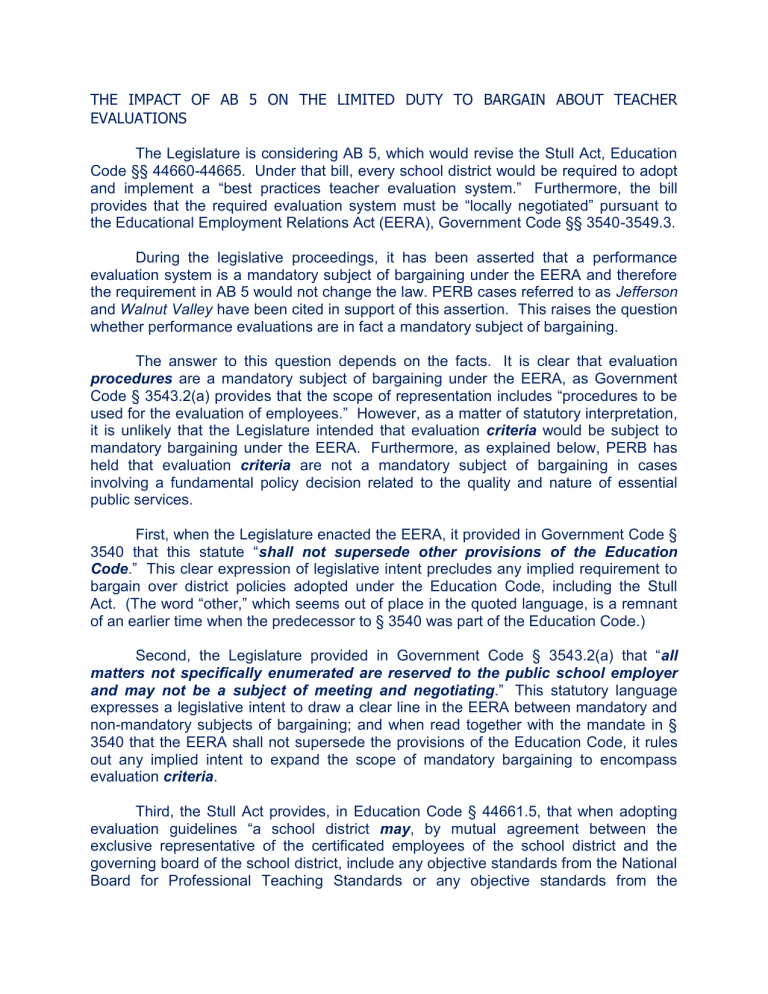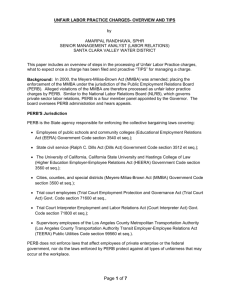Los Angeles Unified`s argument

THE IMPACT OF AB 5 ON THE LIMITED DUTY TO BARGAIN ABOUT TEACHER
EVALUATIONS
The Legislature is considering AB 5, which would revise the Stull Act, Education
Code §§ 44660-44665. Under that bill, every school district would be required to adopt and implement a “best practices teacher evaluation system.” Furthermore, the bill provides that the required evaluation system must be “locally negotiated” pursuant to the Educational Employment Relations Act (EERA), Government Code §§ 3540-3549.3.
During the legislative proceedings, it has been asserted that a performance evaluation system is a mandatory subject of bargaining under the EERA and therefore the requirement in AB 5 would not change the law. PERB cases referred to as Jefferson and Walnut Valley have been cited in support of this assertion. This raises the question whether performance evaluations are in fact a mandatory subject of bargaining.
The answer to this question depends on the facts. It is clear that evaluation
procedures are a mandatory subject of bargaining under the EERA, as Government
Code § 3543.2(a) provides that the scope of representation includes “procedures to be used for the evaluation of employees.” However, as a matter of statutory interpretation, it is unlikely that the Legislature intended that evaluation criteria would be subject to mandatory bargaining under the EERA. Furthermore, as explained below, PERB has held that evaluation criteria are not a mandatory subject of bargaining in cases involving a fundamental policy decision related to the quality and nature of essential public services.
First, when the Legislature enacted the EERA, it provided in Government Code §
3540 that this statute “ shall not supersede other provisions of the Education
Code .” This clear expression of legislative intent precludes any implied requirement to bargain over district policies adopted under the Education Code, including the Stull
Act. (The word “other,” which seems out of place in the quoted language, is a remnant of an earlier time when the predecessor to § 3540 was part of the Education Code.)
Second, the Legislature provided in Government Code § 3543.2(a) that “ all matters not specifically enumerated are reserved to the public school employer and may not be a subject of meeting and negotiating
.” This statutory language expresses a legislative intent to draw a clear line in the EERA between mandatory and nonmandatory subjects of bargaining; and when read together with the mandate in §
3540 that the EERA shall not supersede the provisions of the Education Code, it rules out any implied intent to expand the scope of mandatory bargaining to encompass evaluation criteria .
Third, the Stull Act provides, in Education Code § 44661.5, that when adopting evaluation guidelines “a school district may , by mutual agreement between the exclusive representative of the certificated employees of the school district and the governing board of the school district, include any objective standards from the National
Board for Professional Teaching Standards or any objective standards from the
California Standards for the Teaching Profession if the standards to be included are consistent with this article.” These national or state standards are criteria for evaluating teachers. If the Legislature had intended that such criteria would be a mandatory subject of bargaining, there would not have been any reason to add the permissive language of § 44661.5 to the Stull Act, as it would have been obvious that the district and the union “may” agree on anything within the scope of mandatory bargaining. Furthermore, the EERA became effective in 1976 and thus it was already in existence when § 44661.5 was enacted in 1999 as an amendment to the Stull Act.
Fourth, Government Code § 3543.2—the scope of bargaining provision of the
EERA
—distinguishes between procedures and criteria
, and it does not “specifically enumerate” evaluation criteria as a mandatory subject of bargaining. For example, although that section refers to procedures to be used for the evaluation of employees, and procedures for processing grievances, it also refers to procedures and criteria for the layoff of certificated employees; causes and procedures for disciplinary action; criteria for the payment of additional compensation; and criteria for the negotiation of a salary schedule. This distinction in terminology throughout § 3543.2 leads logically to a conclusion that only evaluation procedures are a mandatory subject of bargaining
—not the criteria used for evaluating employee performance.
Fifth, PERB has expressly acknowledged the distinction in the EERA between evaluation procedures and evaluation criteria. In a landmark case, State of California
(Department of Corrections), Decision No. 1967-S (2008), PERB held that evaluation criteria are not a mandatory subject of bargaining when a decision is made “primarily to implement a fundamental policy decision related to the quality and nature of essential public services.” In that case, the Department of Corrections had added extensive criteria-related requirements to an existing evaluation system because of a problem in the competency of physicians who worked in the state prison system. PERB concluded that adding the new evaluation criteria was not a mandatory subject of bargaining because the decision was made to implement a fundamental policy decision related to the quality and nature of essential public services involved in providing medical care.
The rationale in Department of Corrections is fully applicable to teacher evaluations under the existing Stull Act. There is general agreement that inadequacies in the evaluation system are undermining the educational process throughout a vast school system, and that students have suffered as a result. Accordingly, as in
Department of Corrections , mandatory bargaining over the use of evaluation criteria would significantly abridge the freedom of school districts to exercise managerial prerogatives essential to the achievement of their mission.
In Department of Corrections , PERB distinguished two school district evaluation cases in which it had reached a contrary result many years earlier, Walnut Valley
Unified School District, Decision No. 289 (1983) and Holtville Unified School District ,
Decision No. 250 (1982). One of these decisions is the Walnut Valley case referred to during the legislative process as discussed above. In both of the cases, a school district had refused to bargain over a change in deciding whether employees over a particular
age were competent to continue working. PERB concluded that the change in each case was a basic employment decision and not a fundamental policy decision.
Similarly, the National Labor Relations Board has recognized an exception from the duty to bargain by permitting a change in important policies that are “narrowly tailored to the protection of the core purposes of the enterprise.” Peerless Publications,
Inc ., 283 NLRB 334 (1987).
In this regard, it is a “core purpose of the enterprise” for school districts to improve the education of children, and this requires improvements in the evaluation process.
The right of a school district to change evaluation criteria without a duty to bargain is not affected by the decision in Certificated Employees Council v. Monterey
Peninsula Unified School District, 42 Cal.App.3d 328 (1974). That case was decided almost four decades ago under another statute, the Winton Act, and there are substantial differences between that statute, which was superseded, and the EERA.
PERB’s ruling in
Jefferson School District , Decision No. 133 (1980)
—the second decision relied upon in the legislative process as discussed above
—is distinguishable because PERB expressly stated that the issue in that case involved evaluation procedures . For the same reason, another earlier PERB decision sometimes cited,
Modesto City Schools , Decision No. 347 (1983), is also distinguishable.
In short, while a decision to change evaluation procedures is without question a mandatory subject of bargaining, it is incorrect to state that a change in evaluation criteria is likewise a mandatory subject, especially when the change results from a fundamental policy decision related to the quality and nature of essential public services, such as improving the public education system.



![Labor Management Relations [Opens in New Window]](http://s3.studylib.net/store/data/006750373_1-d299a6861c58d67d0e98709a44e4f857-300x300.png)




